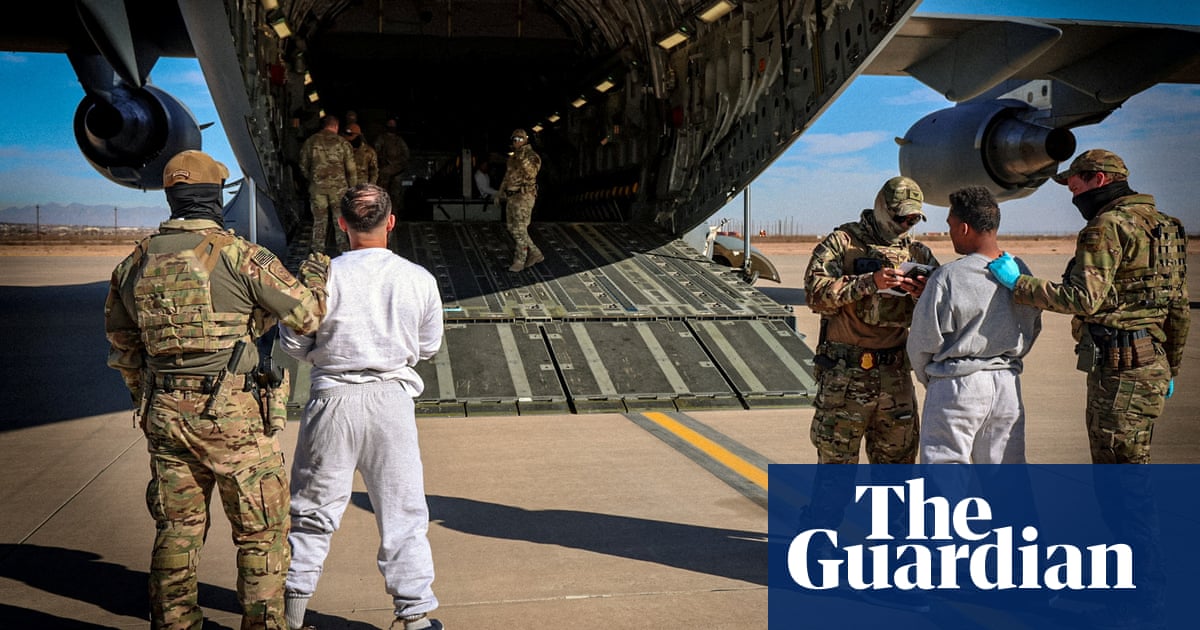The US and Ukraine appeared to be heading towards an irreconcilable rift after Donald Trump escalated his attacks on Volodymyr Zelenskyy, calling the Ukrainian president “a dictator” and warning that he “better move fast” or he “won’t have a country left”.
The US leader’s comments on Wednesday, which were rife with falsehoods, came after Zelenskyy said Trump was “trapped” in a Russian “disinformation bubble,” following Trump’s claims that Ukraine was to blame for Russia’s 2022 invasion, remarks that echoed the Kremlin’s narrative.
In a fiery rant on the Truth Social app marking his most direct threat to end the war on terms aligning with Moscow’s goals, Trump wrote: “A Dictator without Elections, Zelenskyy better move fast or he is not going to have a Country left.”
He added that Zelenskyy had “done a terrible job” and accused the Ukrainian president – without evidence – of benefiting from continuing US financial and military support, suggesting he had an interest in prolonging the war rather than seeking its end.
The US president wrote that Zelenskyy, whom he dismissed as “a modestly successful comedian”, had “talked the United States of America into spending $350 Billion Dollars, to go into a war that couldn’t be won, that never had to start.
“The only thing he was good at was playing Biden ‘like a fiddle’,” Trump wrote.
The unprecedented escalation of tensions between Kyiv and Washington came after senior US and Russian officials met in Saudi Arabia on Tuesday to discuss the war in Ukraine, as well as economic and political cooperation, indicating a fundamental shift in the US approach to Moscow.
Ukraine and Europe were excluded from the talks, increasing fears that Trump could push for a peace deal favouring Vladimir Putin.
“We are successfully negotiating an end to the War with Russia, something all admit only ‘TRUMP’ and the Trump Administration, can do,” Trump wrote. At a conference in Miami later on Wednesday, Trump claimed Zelenskyy could have attended the Saudi talks “if he wanted” – Zelenskyy has denied this, and Trump administration officials were clear beforehand that the talks were bilateral between Russia and the US. Trump said on Wednesday that the talks had gone “very, very well”.
Earlier in the day, Zelenskyy, in a combative press conference in Kyiv, said the US president was pushing “a lot of disinformation coming from Russia”.
“Unfortunately, President Trump, with all due respect for him as the leader of a nation that we respect greatly … is trapped in this disinformation bubble,” Zelenskyy said.
Zelenskyy’s comments, in turn, were a response to a series of inflammatory remarks on Tuesday evening, in which Trump first criticised him and suggested Ukraine was to blame for Moscow’s invasion.
Trump’s latest comments will cast serious doubt on future US aid to Ukraine. Zelenskyy has previously said that Ukraine had little chance of survival without support from the US, a key military partner.
While Zelenskyy said he would like Trump’s team to be “more truthful”, Putin, on the same day, said the US president had begun receiving “objective information” about the war in Ukraine that led him to “change his position”.
Putin also said that he “highly rated” the results of the Russia-US summit in Riyadh. “Russia and the US are cooperating on economic issues, energy markets, space, and other areas,” Putin said, adding that he was happy to meet Trump, but “preparation was necessary”.
On Truth Social, Trump doubled down on his accusations that Ukraine was at fault for Moscow’s invasion. He also claimed Zelenskyy “refused to hold elections”, and was “very low in Ukrainian polls.”
The statements aligned closely with the Kremlin’s narrative on Ukraine, and prompted a rare public challenge by Trump’s former vice-president, Mike Pence, who said in a social media post: “Mr. President, Ukraine did not ‘start’ this war. Russia launched an unprovoked and brutal invasion claiming hundreds of thousands of lives. The Road to Peace must be built on the Truth.”
In a phone call to Zelenskyy late on Wednesday, the British prime minister, Keir Starmer, expressed his support for “Ukraine’s democratically elected leader”, adding that it was “perfectly reasonable to suspend elections during war time as the UK did during World War II”, a Downing Street spokesperson said. German Chancellor Olaf Scholz said that it was “wrong and dangerous” to deny Zelenskyy’s democratic legitimacy.
Earlier, Trump claimed Zelenskyy had a 4% approval rating, and called for a new election. On Wednesday Zelenskyy countered: “As we are talking about 4%, we have seen this disinformation, we understand it’s coming from Russia.”
The Ukrainian president said that he never commented on popularity ratings, “especially my own or other leaders’”, but added that the latest poll showed a majority of Ukrainians trusted him. He added that any attempt to replace him during the war would fail.
While Zelenskyy’s popularity has declined in recent months, a February poll by the Kyiv International Institute of Sociology (KIIS) found that 57% of Ukrainians trusted him, up from 52% a month earlier.
Mykhailo Fedorov, the head of Ukraine’s digital affairs ministry, argued on Wednesday that Zelenskyy’s ratings were “4-5%” higher than Trump’s.
Ukrainian legislation bans elections during martial law, which has been in place since Russia launched its invasion in February 2022. Few Ukrainians support the idea of a poll at a time when Russia’s invasion has forced millions to flee abroad, and when Ukrainian soldiers are fighting and dying on the frontline.
Ruslan Stefanchuk, the speaker of Ukraine’s parliament, said Ukraine was not “giving up” on elections. “Inventing ‘democracy’ under shelling is not democracy, but a spectacle in which the main beneficiary is in the Kremlin. Ukraine needs bullets, not ballots,” he wrote on his Facebook page.
after newsletter promotion
Zelenskyy also disputed Trump’s comments that most of Ukraine’s support came from the US. “The truth is somewhere else,” Zelenskyy said, adding that he remained “grateful for the support” and wanted “the Trump team to have true facts”. He then said that the US supplied $67bn in weapons and $31.5bn in budget support.
Discussing a Trump-led initiative to corner his country’s critical minerals as a down-payment for continued military and economic aid, Zelenskyy said that he could not “sell Ukraine away” but he was prepared to work “on a serious document” if it contained “security guarantees”.
The US had proposed taking ownership of 50% of Ukraine’s critical minerals, but the proposal appeared to lack any security guarantees, such as the deployment of US troops in Ukraine.
Zelenskyy’s team has placed high importance on the need for guarantees from the US that would deter Russia from launching a new invasion once a peace deal was reached.
On Wednesday, Keith Kellogg, Trump’s Ukraine envoy, arrived in Kyiv for talks with Ukrainian leaders. He is viewed as Trump’s most pro-Ukraine adviser, albeit one with declining influence. “We understand the need for security guarantees,” Kellogg told journalists, saying that part of his mission would be “to sit and listen”.
Zelenskyy’s remarks included a challenge to Kellogg to “go and talk to ordinary Ukrainians about their reception of Trump’s comments”.
Late on Wednesday, Zelenskyy said he hoped for a “constructive” meeting with Kellogg the following day.
Earlier in the day, at a second meeting of European leaders in Paris, arranged by the French president, Emmanuel Macron, there were more calls for immediate action to support Ukraine and bolster Europe’s defence capabilities, but few concrete decisions.
Macron and Starmer will visit Washington next week, amid other meetings aimed at bringing an end to Russia’s war in Ukraine, according to the White House national security adviser Mike Waltz.
The EU on Wednesday agreed on a 16th package of sanctions against Russia, including on aluminium and vessels believed to be carrying sanctioned Russian oil.
Meanwhile, Russia’s foreign minister, Sergei Lavrov, who was part of the delegation in Saudi Arabia, hailed Trump for criticising “pathetic” Zelenskyy and welcomed the US president’s claim that past US support for Ukraine’s Nato ambitions was a key factor in sparking the war.
Russian officials also seized on Trump’s latest remarks that questioned Zelenskyy’s legitimacy as Ukraine’s president. Pyotr Tolstoy, a senior member of Russia’s State Duma, called Trump’s remarks “significant” and suggested they would be “of great interest to those who call themselves politicians in Kyiv”.
Reuters contributed to this report
Article by:Source: Pjotr Sauer and Luke Harding in Kyiv












